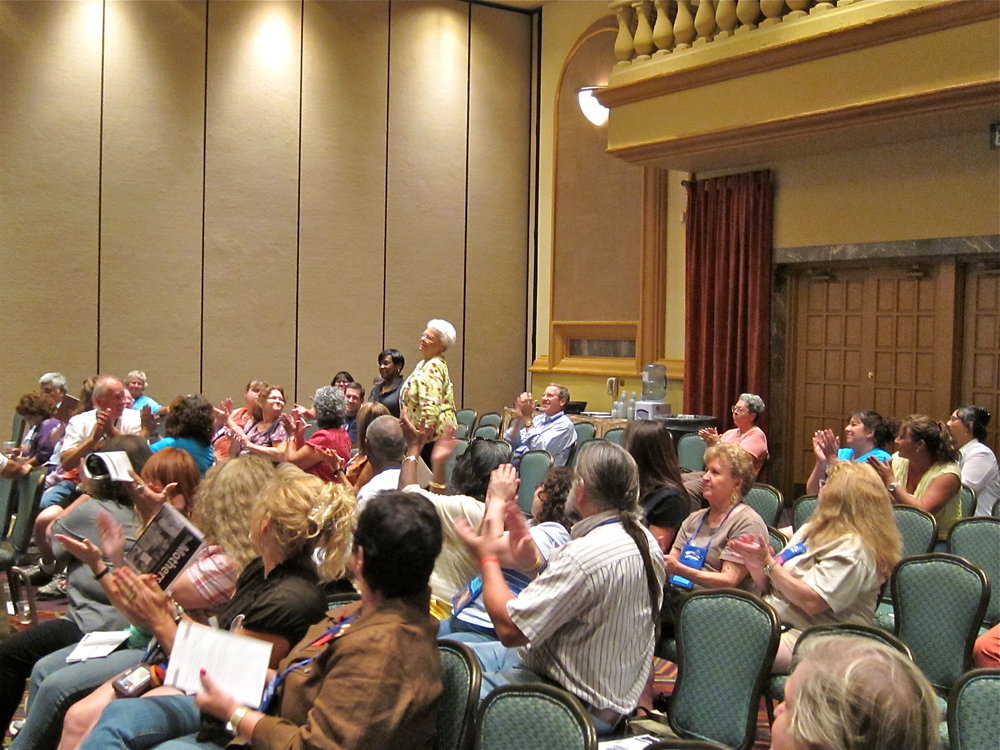 Diane Jones, left, and Mina Hampton, right, two mothers featured in the film, "The Mothers," receive applause after the screening in Phoenix.
Diane Jones, left, and Mina Hampton, right, two mothers featured in the film, "The Mothers," receive applause after the screening in Phoenix.
I recently traveled to Arizona to show my short documentary to parents and family members whose loved ones were murdered.
About 350 people, including two of the Durham, N.C., mothers in my film, gathered in Phoenix Aug. 9-12 for the 26th annual Parents of Murdered Children national conference.
The conference featured keynote speakers and about 40 workshops, from “A Mother’s Grief” and “Cold Cases & Overview of Homicide Investigation” to “Ask the Medical Examiner” and “When Your Child’s Lifestyle is Judged.”
“It shows the world that our loved ones will never be forgotten,” said Dan Levey, the organization’s executive director, as he stood before wood plaques, each bearing the names, dates of birth, and dates of death of several thousand murder victims. The plaques were unveiled to attendees on the first night of the conference during a ceremony facilitated by members of a police honor guard.
My film, “The Mothers,” is a 10-minute documentary about a group of Durham, N.C., mothers who support each other through grief and healing after their child’s murder. It was shown Aug. 9 during the training workshop for leaders of Parents of Murdered Children support group chapters across the country.
The reaction from the audience of about 100 was positive and affirming. “We have a story to be told,” said Levey, whose brother, Howard, was murdered in 1996. During a question-and-answer session after the film, audience members asked why I made the film. One individual said it was a “brave choice” to cover murder as a topic.
I learned things, too. Some family members of homicide victims find the expression of sympathy, “I’m sorry for your loss,” almost offensive. One woman said friends and family of homicide victims don’t “lose” anyone. “They were ‘taken’ from us,” she said.
Closure, which was covered in my film, was another important point. A woman in the audience noted, “there’s never closure. What you learn to do is live with the pain.”
The highlight moment for me came when two of the mothers featured in my film – Diane Jones and Mina Hampton, the co-leaders of the Durham, N.C., chapter – stood and received a round of applause from their chapter leader peers from across the country.
 Diane Jones, left, me, and Mina Hampton during the conference.Here are highlights from some workshops I attended:
Diane Jones, left, me, and Mina Hampton during the conference.Here are highlights from some workshops I attended:
A Mother’s Grief (Part 1)
Beckie Miller, the 2012 conference co-chair, led Part 1 of this workshop. Her son, Brian, was robbed and shot to death in Phoenix in 1991. For nearly 20 years, she has led the Phoenix chapter of Parents of Murdered Children with 1,500 members. She said there’s never justice and the pain never ends. “It does get easier, but it’s never easy,” she said. She stressed the importance of coping skills like honoring a child by finding a cause and referenced John Walsh as an example. “There’s always something you can do to give yourself a way to endure,” Miller said.
Neuroscience of Trauma and the Brain
Dr. Joanne Cacciatore, a professor at Arizona State University who specializes in counseling those affected by traumatic losses like the death of a child, talked about the effects of traumatic experiences on the brain. She suggested working toward a “calm and centered” brain and offered ways to help repair damage from trauma by practicing yoga, meditating or performing service. “Any time you do something nice for someone else, you’re doing something nice for yourself,” she said. How does Cacciatore practice mindfulness? She hikes barefoot once or twice a week.
When Your Child’s Lifestyle is Judged
Gayle Moffitt and Mary Elledge led this workshop to help parents struggling with their loved ones being blamed for their murder because of a lifestyle. Moffitt’s daughter, Diana, was a prostitute when she was murdered in 1987. Her case remains unsolved. Examples of some other lifestyles cited during the workshop included being in a gang or living homeless. “That person had people who loved them, and who are we to judge?” Elledge asked. “…The person responsible is the person who committed the crime.”
(Editor's Note: I paid my own conference, travel and lodging fees.)





